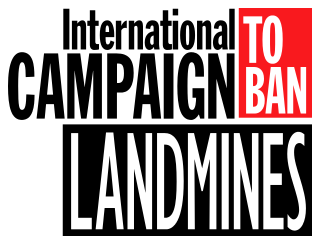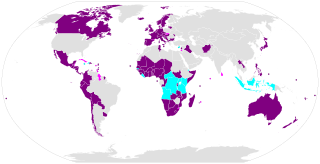The Vietnam Veterans of America Foundation (VVAF), established in 1980, now the Veterans for America (VFA), is a Washington, D.C.-based international humanitarian organization that addresses the consequences of war and conflict. The founder of VVAF is Bobby Muller, a former U.S. Marine lieutenant and Vietnam veteran.

Survivor Corps is a global network of survivors helping survivors to recover from war, rebuild their communities, and break cycles of violence. The organization currently operates programs in Albania, Armenia, Azerbaijan, Bosnia-Herzegovina, Burundi, Colombia, Croatia, El Salvador, Ethiopia, Georgia, Jordan, Kosovo, Macedonia, Montenegro, Serbia, Uganda, Rwanda, the United States and Vietnam.

Jerry White is the CEO of Global Impact Strategies Inc. and the Co-Chair of Global Covenant Partners. He is known for co-leading high-impact campaigns including the historic International Campaign to Ban Landmines, co-recipient of the Nobel Peace Prize. He co-founded Survivor Corps, formerly Landmine Survivors Network, created by and for survivors to help victims of war rebuild their lives.
The Cluster Munition Coalition (CMC) is an international civil society movement campaigning against the use, production, stockpiling and transfer of cluster munitions. Cluster munitions are a type of explosive weapon widely stockpiled by more than 80 states. They are documented to have caused significant civilian deaths and injuries and have frequently caused indiscriminate effects both during and after conflicts. Their use is prohibited under the 2008 Convention on Cluster Munitions. This convention was formally endorsed on 30 May 2008 in Dublin, Ireland, and was signed by 94 countries in Oslo on 3–4 December 2008. The Convention entered into force and became binding international law on 1 August 2010, after 30 countries formally ratified it. As of 4 January 2012, it had been signed by 111 countries, 77 of which have ratified it.
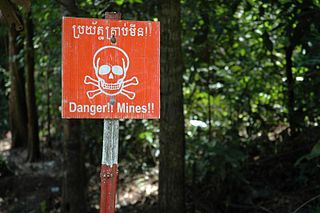
Cambodia is a country located in South East Asia that has a major problem with landmines, especially in rural areas. This is the legacy of three decades of war which has taken a severe toll on the Cambodians; it has some 40,000 amputees, which is one of the highest rates in the world. The Cambodian Mine Action Centre (CMAC) estimates that there may be as many as four to six million mines and other pieces of unexploded ordnance in Cambodia. Some estimates however run as high as ten million mines.
A mine clearance organization, or demining organization, is an organization involved in removal of landmines and unexploded ordnance (UXO) for military, humanitarian, or commercial reasons. Demining includes mine clearance, as well as surveying, mapping and marking of hazardous areas.

The start of the period 1994 to 2002 of the Lord's Resistance Army insurgency in northern Uganda saw the conflict intensifying due to Sudanese support to the rebels. There was a peak of bloodshed in the mid-1990s and then a gradual subsiding of the conflict. Violence was renewed beginning with the offensive by the Uganda People's Defence Force in 2002.

Humanity & Inclusion is an international non-governmental organization. It was founded in 1982 to provide help in refugee camps in Cambodia and Thailand. Headquartered in France and Belgium, since its creation, it has opened branches in six other countries : Switzerland, Luxembourg, United Kingdom, Germany, Canada and the United States.
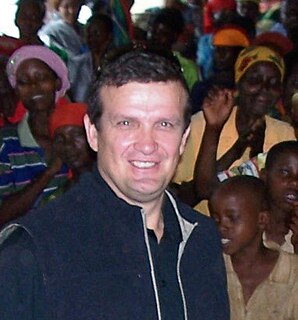
Kenneth R. Rutherford is co-founder of the Landmine Survivors Network and a researcher in the field of political science.
The United Nations International Day in Support of Victims of Torture – 26 June is an international observance held annually on 26 June to speak out against the crime of torture and to honour and support victims and survivors throughout the world.
This is a day on which we pay our respects to those who have endured the unimaginable. This is an occasion for the world to speak up against the unspeakable. It is long overdue that a day be dedicated to remembering and supporting the many victims and survivors of torture around the world.
On this International Day in Support of Victims of Torture, we express our solidarity with, and support for, the hundreds of thousands of victims of torture and their family members throughout the world who endure such suffering. We also note the obligation of States not only to prevent torture but to provide all torture victims with effective and prompt redress, compensation and appropriate social, psychological, medical and other forms of rehabilitation. Both the General Assembly and the Human Rights Council have now strongly urged States to establish and support rehabilitation centers or facilities.
Mine action is a combination of humanitarian aid and development studies that aim to reduce the social, economic and environmental impact of landmines and the explosive remnants of war (ERW).
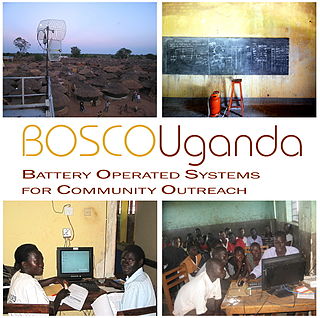
BOSCO-Uganda is a private, non-profit effort to put wireless internet and VoIP telephony into the internally displaced persons camps of northern Uganda, in cooperation with the Archdiocese of Gulu. BOSCO collaborated with Inveneo to place their low-power PCs powered by solar panels in the Catechist Training Center and the Caritas Office in Gulu, as well as at schools, hospitals, colleges and Churches in the Pabbo, Alero, Lacor, Coope, Jen'Geri, Unyama, and Pagak IDP camps. The organization aims to use ICT to help end the isolation of communities in rural northern Uganda as well as improve education, economics, human rights documentation, health care and rural development.
The Swiss Campaign to Ban Landmines is a member of the International Campaign to Ban Landmines (ICBL). It is an umbrella organisation composed of about 50 Swiss NGOs gathered around the common objective of banning antipersonnel landmines and similar indiscriminate weapons. At the national level, the Swiss Campaign to Ban Landmines successfully advocated in favor of a national ban of antipersonnel landmines and of Switzerland’s signature and ratification of the Ottawa Treaty in 1995-1997. Within the ICBL, the Swiss Campaign was a member of the Non State Actors Working Group, which it co-chaired until the end of 2004.
Railway stations in Uganda include:

The Cluster Munitions Ban Advocates are a group of individuals whose lives have been affected by cluster munitions, a particular type of explosive weapon that has been banned for its indiscriminate area effects and risk from unexploded ordnance. They come from Afghanistan, Albania, Cambodia, Croatia, Ethiopia, Iraq, Laos, Lebanon, Tajikistan, Serbia and Vietnam. The Ban Advocates took an active role in the Oslo Process on cluster munitions that led to the Convention on Cluster Munitions, a treaty banning cluster munitions and providing innovative provisions to assist the victims of these weapons. The Ban Advocates initiative was launched in October 2007 by Handicap International Belgium, a founding member of the Nobel Peace Prize-winning International Campaign to Ban Landmines. The Ban Advocates spoke in front of the international community on many occasions. According to the Irish Minister for Justice, "The indomitable spirit of the Ban Advocates, overcoming terrible injuries to bear witness to the horrors of cluster munitions, inspired us throughout." The Ban Advocates blog provides regular updates on their work around the world.
Centenary Bank is a commercial bank in Uganda. It is one of the commercial banks licensed by the Bank of Uganda, the central bank and national banking regulator.

The United Nations Mine Action Service (UNMAS) is a service located within the United Nations Department of Peacekeeping Operations that specializes in coordinating and implementing activities to limit the threat posed by mines, explosive remnants of war and improvised explosive devices.
The Organization of Amputees Republike Srpske (UDAS) is registered as a nonprofit organization and non-governmental organization based in Banja Luka, Bosnia and Herzegovina, founded by amputees which are mostly landmine victims in order to provides support for victims of landmines, unexploded ordnance (UXO), cluster munition and other persons with disabilities and their families to integrate them back into the community, thus enabling them to live normal lives.
Legacies of War (Legacies) is a non-profit, non-partisan project dedicated to raising awareness about the history of the Vietnam War-era bombing during the Secret War in Laos. Through the use of art, culture, education, and advocacy Legacies works towards the clearance of unexploded ordnance (UXO), providing medical services for victims of UXO, and promoting a lasting legacy of peace and hope in Laos.









